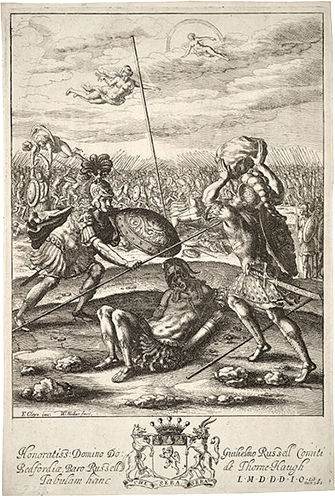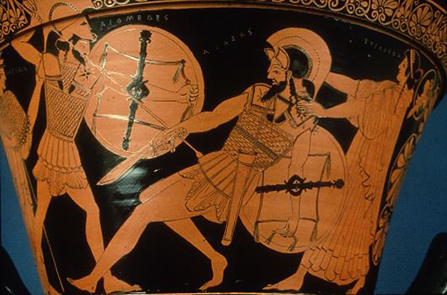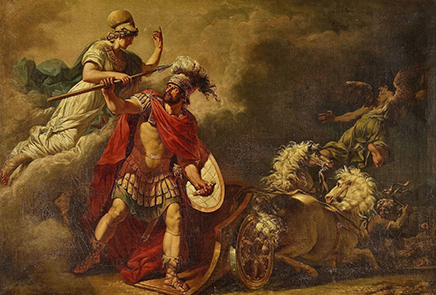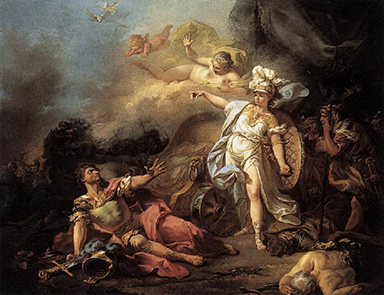

The fifth book begins by continuing to narrate the story of the battle that started when Pandarus broke the truce in Book 4. In the fourth book Agamemnon had implied that Diomedes was acting cowardly when he stood behind his troops. As this book begins we are told that Athena has granted Diomedes “strength and daring.” He consequently achieves a number of kills. He kills Phegus with his spear and would have killed his brother, Idaeus, except that Hephaestus carries him to safety. Their father, Dares, had been Hephaestus’s priest. Meanwhile, Athena asks Ares, the god of war, to keep out of the fighting and let the mortals fight it out. Ares sits out of the fight with Athena and the Achaeans begin to drive the Trojans back, as a series of hand-to-hand combats results in the deaths of several men.
But Diomedes stands out in this battle, fighting wildly so that it is difficult to see upon which side he fights. The Trojans panic under his attack. But Pandarus again uses his skill with the bow and wounds Diomedes in the shoulder. Diomedes calls for Sthenelus to withdraw the arrow from him. He does, and then Diomedes prays to Athena for the chance to kill Pandarus. In answer to his prayer Athena gives Diomedes the power to distinguish between mortals and gods on the battlefield. She warns him to fight none of the gods except Aphrodite. Diomedes returns to the fighting and is once again ferocious, killing several men, including a front line captain, Hypiron, as well as Abas and Polyidus and brothers Xanthus and Thoon, along with brothers Echemmon and Chromius. Aenaes, seeing what is happening, demands that Pandarus target Diomedes. Pandarus says he is unsure whether Diomedes is a man or god, but tells Aeneas that he fights with a god beside him. He explains he has already shot Diomedes. Pandarus regrets not following his father’s advice to bring a chariot to Troy. He has already wounded Menelaus and now Diomedes, and neither man has died. He feels his bow is worthless.
Aeneas offers Pandarus the choice to either drive his chariot or fight the Greeks hand to hand. Pandarus leaves Aeneas to drive the chariot, while he elects to fight hand to hand. Sthenelus sees Aeneas and Pandarus bearing down upon Diomedes in the chariot and gives him a warning. Diomedes refuses to retreat from the chariot, even though he is on foot. He tells Sthenelus that if he can kill Aeneas and Pandarus, he wants Sthenelus to steal Aeneas’s horses. Pandarus is emboldened when he sees Diomedes standing his ground. He thrusts at Diomedes with his spear and pierces his shield. But he fails to wound Diomedes. Diomedes throws a spear at Pandarus which hits him between the eyes and kills him. Aeneas, fearing Pandarus’s corpse will be taken, jumps from his chariot to protect it. But Diomedes throws a boulder at him, which breaks Aeneas’s hip, bringing him down.
Aeneas is saved by Aphrodite, his mother, who flings her robe in front of him to deflect weapons. Meanwhile, Sthenelus fulfils his promise to capture Aeneas’s horses, while Diomedes hunts Aphrodite through the battle. She is still protecting Aeneas when Diomedes wounds her with his spear in her wrist, causing her to drop Aeneas. Apollo immediately takes up Aeneas to protect him, and chastises Aphrodite, telling her to leave the battle. Iris leads her from the battle and she sees Ares sitting on a cloudbank with his horses. Aphrodite begs him to lend her the horses so she can return to Olympus. He does so and she returns to Dione, her mother. She tells Dione what has happened and seeks her comfort. Dione recalls other incidents when Ares, Hera and Hades suffered wounds at the hands of mortals, as well as Heracles’s attempt to shoot arrows at Olympus. She reflects that Diomedes will not have long to live if he attacks the gods. Dione heals Aphrodite’s wound. Hera and Athena, who see this, mock her to Zeus, suggesting that Aphrodite has been luring other Greek women to lust after Trojans. Zeus tells Aphrodite that she should not concern herself with matters of war. Meanwhile, on the battlefield, Diomedes sees that Apollo is protecting Aeneas, but even so he still attempts to kill him. Apollo warns Diomedes to back off. Diomedes retreats and Apollo sweeps Aeneas from the battle to the top of Mt Pergamus. There he heals Aeneas. Meanwhile, Apollo creates a copy of Aeneas so that the Trojans may gather around it and continue the fight. Back at the battle, Apollo tells Ares that Diomedes must be removed from the battle, since he is attacking gods and men alike. Instead, Ares wades into the battle to spur the Trojans on while Apollo returns to Pergamus.
Sarpedon, a Trojan ally, taunts Hector, calling his family cowards because, except for Hector, they hide behind Troy’s walls while allies like Sarpedon fight with nothing personally to defend. Hector is shamed into action by Sarpedon and leads his men in a renewed resistance. Ares, wishing to help the Trojans, clouds the battle in night. Meanwhile, Apollo returns Aeneas to the battle, which raises the spirits of his men.
On the Achaean side, Diomedes and Odysseus spur the Greeks on to attack, while Agamemnon urges the men to be courageous, saying that courageous action, in this instance, is in fact safer. He makes his point by spearing Aeneas’s comrade in arms, Deicoon, whom he kills. Seeing this, Aeneas kills two Argive captains. Menelaus, in turn, bursts through the front line, driven on by rage encouraged by Ares, who hopes to see Menelaus killed by Aeneas. But Antilochus, fearing Menelaus will be killed – which would make the whole campaign pointless, since its stated purpose is to return Helen to Menelaus – enters the fight on Menelaus’s side. Aeneas is forced to drop back. Together, they now begin killing other Trojans, Pylaemenes, and Mydon, whom Antilochus runs down with his own horses and chariot after he falls when his elbow is hit by a rock, thrown by Antilochus. Hector, spotting them, rushes in with his shock troops backing him, and Diomedes perceives that Hector is now supported by Ares. He warns his troops not to engage Hector.
Hector kills Menesthes and Anchialus, and Greater Ajax defends their bodies. Ajax kills Amphius but fails to strip his body of armour due to the relentless attack of the Trojans. Meanwhile, Tlepolemus, Heracles’s son, taunts Sarpedon that he is no great fighter and not worthy of the great fighters who have preceded him: that his support will be of little consequence for Troy. Sarpedon is defiant against Tlepolemus’s taunts. The two men attack each other, but each receives a spear wound. Sarpedon is ushered from the battle and Tlepolemus is also carried away. Odysseus, frustrated that he cannot end Sarpedon, kills several men in a rage as he tries to get nearer. When Hector intervenes to stop Odysseus’s onslaught, Sarpedon begs him for protection. But Hector moves on and Sarpedon dies as the spear is removed from his flesh.
Meanwhile, the Argives give ground under the onslaught of Hector and Ares. Seeing the deaths of several Argive solders, Hera urges Athena to act to stem the tide of Ares’ attack. Hera’s chariot is fitted out to take Athena into the battle. She mounts the chariot with Hera. As they are leaving Olympus they come across Zeus. Hera asks Zeus to not interfere if she strikes at Ares. Zeus agrees. Hera drives her chariot down to Troy and causes grass to grow beside the Simois River so that her horses might graze. She then speaks to the Greeks and shames them for their having given ground. She says that when Achilles fought no Trojans ventured from the gates of Troy: now they may get as far as the Greek ships.
While Hera speaks to the troops Athena finds Diomedes. He has given the order not to fight Hector and Ares. Athena reminds him of the glory of his father at Thebes, essentially trying to shame him into more action. But Diomedes points out that his inaction is due to her own command, that he should not engage any god in battle except for Aphrodite. So Athena now urges Diomedes to fight Ares. She says he promised to fight against the Trojans, yet here he is, now fighting on their side. Athena throws Sthenelus from the chariot so she can ride with Diomedes. They charge Ares as he strips Periphas of his armour. But Ares sees only Diomedes in the chariot, since Athena is wearing “the dark helmet of Death”, and he attacks back. But Diomedes, aided by Athena, gives Ares a terrible wound. He flees to Olympus where he shows Zeus his wound. He expresses his anger that Athena acts against him, and that Zeus does nothing about it. But Zeus is not willing to placate Ares. Zeus tells Ares that he hates him because he loves strife and battles. Zeus says that he only tolerates Ares in Olympus for the sake of his mother, Hera. Nevertheless, Zeus orders that Ares be healed. Hera and Athena returns to Olympus, having stopped Ares murderous rampage.
There is always a sense of the anthropomorphic nature of Greek gods. Not only do the gods engage in conflict between each other, but their interference in human affairs, as we see happening in The Iliad, means their stories are intertwined and that the conflict between gods is not only worked out in their own sphere, but the human world too. For a start, conflict between the gods is the catalyst for the whole Trojan campaign as we receive it according to the story told by Homer. Although the story of the judgement of Paris does not appear in The Iliad, and is only mentioned late in the poem, it was well known to ancient Greek audiences. In short, Paris was asked to judge the most beautiful of three goddesses, Athena, Aphrodite and Hera at a wedding, so that the winner might be given a golden apple which Eris, the goddess of discord, left at the wedding as revenge for not being invited. Aphrodite bribed Paris to win the contest by presenting him Helen, wife of Menelaus, which legend has it, is the casus belli for the Trojan War.
Book 5 of The Iliad illustrates, as no book has done before it, how the dispute of the gods is played out in the human world. The following notes on three characters attempts to consider the key characters a little beyond the surface of what the narrative immediately offers: that is, to deliberately read against the perspective the text seems to offer.
In Book 5 the story is primarily told from the perspective of certain characters: Athena and Diomedes, as well as Zeus late in the book. The narrative seems to privilege their discourse over that of Ares whom Zeus describes in a series of negative epithets as, “lying, two-faced” and “incorrigible”. Zeus abhors Ares for his love of “battles [and] the bloody grind of war” and says he has an “uncontrollable rage.”
For modern readers, Ares may represent the carnage and violence of war beyond the character, and this is certainly a well-supported reading, given the swathes of Greek and Trojan dead left lying side by side at the end of Book 4, and the chaotic and violent scenes portrayed in this book. What reasonable person would not abhor war? But as a character – someone with motivations which are complex and in conflict with others – rather than as an anthropomorphised state, Ares is less obviously to blame for what we are, on the surface, invited to believe is his fault.
At the start, his chaotic and destructive nature is initially better ascribed to Diomedes. Athena urges Ares to remain out of the conflict at the beginning of this book, suggesting that his involvement will heighten the stakes of the battle to a level of horror not normally expected even in ordinary warfare. As a result, Ares does sit it out. In fact, Book 5 begins by telling us that:
Diomedes, from the start, is an instrument of Athena. The power she gives him is meant to turn the tide of battle against the Trojans and asking Ares to sit it out means she wants Diomedes to wreak havoc unopposed. It is Diomedes who rages through the battle so fiercely that it is difficult to tell which side he fights upon. Ares acts because Apollo tells him that Diomedes needs to be removed from the battle, but instead of doing this, Ares chooses to support the Trojans, which only seems to escalate the bloodshed, especially when he lends his force to Hector. Ares actions in the latter half of the book seem to reflect the brutal fight that Diomedes engages in the earlier sections. Athena raised the stakes of the battle which brought Ares back to the conflict.
Hera’s determination that Ares needs to be stopped does not address the problem that Athena first set in motion this heightened conflict by favouring Diomedes. It is a point Ares makes himself when making an appeal to Zeus.
When Ares appeals to Zeus at the end of the book he makes a case that Athena is the real problem. Having been born from Zeus’s forehead she represents a part of Zeus’s power and intellect, so this is not a wise argument, even though it seems sound. He points out that Athena’s enabling of Diomedes is what heightened the conflict and caused the wounding of Aphrodite. But it is clear that Zeus despises Ares, whatever his arguments might be, which may be explained as displaced anger against Hera, Ares’s mother: “You have your mother’s uncontrollable rage”. Zeus will allow Ares to remain in Olympus for the sake of Hera, but it seems Ares’s position has been defined by a rage Zeus cannot openly express against his wife. It is an interesting psychological position. Since we see the conflict in Book 5 from the point of view of Diomedes and Athena, we are invited to see Ares as the real villain. But these insights provide a means by which we can read against the narrative.
Aphrodite is treated with an open level of contempt in Book 5. This is in contrast to the sympathetic treatment Homer gives Helen in Book 3. In fact, Athena explicitly encourages Diomedes to hunt Aphrodite in the battle. Later Athena upbraids Diomedes for not solving another problem that has emerged – that of Ares. But Diomedes rightly points out he has been forbidden to fight any god except Aphrodite, and Athena has provided him with the means to hunt her: the ability to distinguish between mortals and gods on the field of battle. It is clear that Athena is using Diomedes as her instrument of revenge. Athena’s antipathy is reflected in Diomedes words to Aphrodite after he wounds her:
Aphrodite appears on the field of battle to protect her wounded son, Aeneas, and by the account of the action she would seem to be courageous:
Even so, Aphrodite is the subject of abuse and mockery in this book. Homer’s narrative reflects Diomedes’s contempt just before he stabs Aphrodite, calling her a “coward goddess”. And when Aphrodite seeks comfort from her mother, Dione, Athena and Hera overhear the conversation and mock her to Zeus:
Their reference to “another Argive” implies a woman in addition to Helen, who is implicitly said to “pant and lust for Trojans”. Yet this salacious representation is not the reality of Helen as we have seen from Book 3. Helen is a dignified and sad woman. And the representation of Aphrodite in this book plays to misogynistic clichés against women and desire. Yet while we are invited to side against Aphrodite and Ares through their representations, it is the actions of Athena and Hera that seem more worthy of the schoolyard in this book: petty and vengeful. This reading is against the reading invited by the narrative, which is mostly from the point of view of Athena and Diomedes. But it is Athena’s actions – her use of Diomedes as a weapon – which heightens the conflict and brings Ares into battle on the Trojan side

The above engraving accurately captures the moment just before Diomedes throws a boulder at Aeneas. Diomedes has been granted superhuman strength by Athena. He has already killed Pandarus, whose corpse lies between the two combatants with a spear thrust through his eye. This is close to Homer’s description of his death – Homer suggests he was speared between the eyes - in which the spear travels downwards, cracking his teeth, cutting off his tongue, and smashing his jaw before the point of the spear exits beneath his chin. Homer’s descriptions of battle wounds are extremely graphic and realistic.

This pottery piece shows the same scene, but it is not as faithful to the text. Pandarus’s body is not evident, nor is the boulder thrown by Diomedes which makes it necessary for Aphrodite, his mother, to intervene in order to save his life. The action is two-dimensional and stylised, the figures flattened against the amphora. Instead of representing the scene realistically, it suggests the key figures and their alliances in the battle. Each character is labelled. Athena can just be seen behind Diomedes, to the left, while Aphrodite reaches out from the right of Aeneas to save him.

Athena’s role in the success of Diomedes in Book 5 is undoubted, but it is hard to reconcile this painting with any particular scene, exactly. There are three key moments when Athena interacts with Diomedes. First, is when he prays for her: she appears before him to encourage him, to give him “your father’s strength” and the power to distinguish gods from mortals in the battle. Two other scenes have Diomedes near or on his chariot in the remainder of the book while in Athena’s presence. First, is when she comes to reprimand him for not attacking Ares: “Hard by his team and car she found the king.” The next scene is when Athena accompanies Diomedes in his chariot to fight against Ares. This is an extract from that scene:

The fight against Ares becomes the key objective in this book. By the end of Book 4 the fighting has become so furious that ranks of Trojans and Achaeans lie dead together on the battle field. In this book Ares is meant to be fighting on the side of the Achaeans, yet he supports the Trojans and thereby escalates the bloodshed. Athena, in particular, seeks to bring him down and she provides Diomedes with the power to do that. She rides in Diomedes’s chariot and together they deliver Ares a terrible wound that causes him to flee from the battle field to Olympus. This painting depicts a triumphant Athena with the chariot in the background, while it diminishes the role Diomedes has played. There is no figure who seems to represent him. Ares’s abject figure, as represented here, does not explicitly occur in the poem. Instead, his pain is uttered as a shriek that sends a terrifying shudder through the ranks of troops before he escapes.
Comments
No one has commented yet. Be the first!